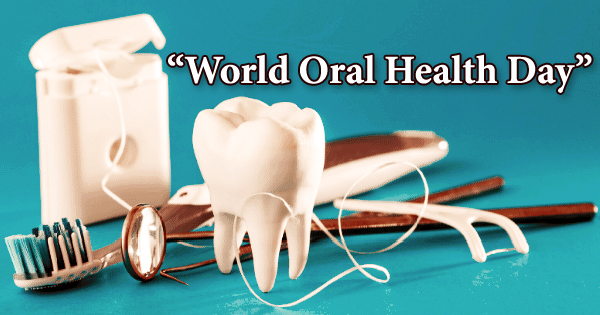Every year on March 20, World Oral Health Day kicks off a year-long effort to raise global awareness of oral health concerns and the significance of oral hygiene so that governments, health organizations, and the general public may work together to achieve healthier mouths and happier lives. The goal of the day is to provide people with the knowledge, skills, and confidence they need to maintain good oral health. Oral diseases are a serious public health problem in many nations, and they have a long-term detrimental influence on people. Oral diseases cause pain and discomfort, as well as social isolation and a loss of self-esteem, and they are frequently connected to more significant health problems. However, there is no need to suffer: the majority of oral health problems are generally preventable and treatable in their early stages. Everything we consciously or unconsciously consume enters our bodies through our lips. In order to stay healthy, it is essential to pay close attention to oral hygiene. Oral disease affects a large percentage of the population. As a result, the FDI World Dental Federation hosts this yearly event to raise global awareness. 90 percent of the world’s population will develop oral illnesses over their lifetime, many of which are preventable. World Oral Health Day is organized by the FDI World Dental Federation and involves campaigns by national dental associations from all over the world, with events in over 130 countries, including the Nigerian Dental Association (NDA) and the National Association Of Dental Students (NADS). The first World Oral Health Day was celebrated in 2013. The day also marks the beginning of a year-long program to promote oral health and disease prevention. Many things travel through our mouth, including food, vital nutrients, and germs and bacteria. As a result, regardless of age, it is essential to maintain good dental health. People of all ages can develop a variety of oral illnesses. Tooth decay, gum disease, cavities, and foul breath are all harmful to our health, and neglecting them might put our bodies at risk.
The FDI World Dental Federation organizes conferences and seminars to commemorate the day and raise awareness about oral health and cleanliness. To carry out World Oral Health Day in each nation and establish a truly global movement, FDI relies on individual involvement globally. Diabetes patients have a low resistance to infection and a sluggish healing process, making them more prone to oral health issues. Gum disease develops as plaque builds up and hardens over time. Gums become swollen, inflamed, and may bleed. If not treated promptly, this can progress to the advanced stage of periodontitis. Brushing with a soft-bristled toothbrush on a regular basis should be part of your oral hygiene regimen. Flossing and mouthwash are recommended to eliminate obstinate plaque. A mouthwash cleans the entire mouth while also removing bacteria and plaque, which are the core causes of gum disease. Since 2014, FDI has organized an annual international competition for the finest awareness and preventive events performed by dental student groups in honor of World Oral Health Day, in conjunction with its daughter organization, the International Association of Dental Students (IADS). Diabetes patients are more likely to lose their teeth than non-diabetic patients. If a diabetic has an infection in the mouth, it will take longer for the infection to heal, which can have a direct influence on the bone that supports the teeth, eventually leading to tooth loss. As a result, it’s best to be careful by getting regular dental check-ups and following a good oral hygiene regimen. In February 2017, IADS introduced the WOHD Portal, a digital platform for coordinating and analyzing the action plans and final reports of its national and local member organizations. On September 12, 2007, WOHD was initially announced and commemorated; however, the campaign did not begin until 2013. To avoid conflicts with the FDI World Dental Congress in September, the event will be commemorated on March 20. The date was chosen to emphasize the significance of proper dental cleanliness and care since children must have 20 baby teeth and seniors must have 20 teeth at the end of their lives. Adults should have 32 teeth and no dental cavities. Mouth dryness can be reduced by drinking more water and eating sugar-free gum. If you have dry mouth, you should see your dentist on a regular basis and brush and floss every day. World Oral Health Day is an initiative of the FDI World Dental Federation, a non-profit organization dedicated to bringing the world of dentistry together with the goal of attaining excellent oral health for everyone.
















